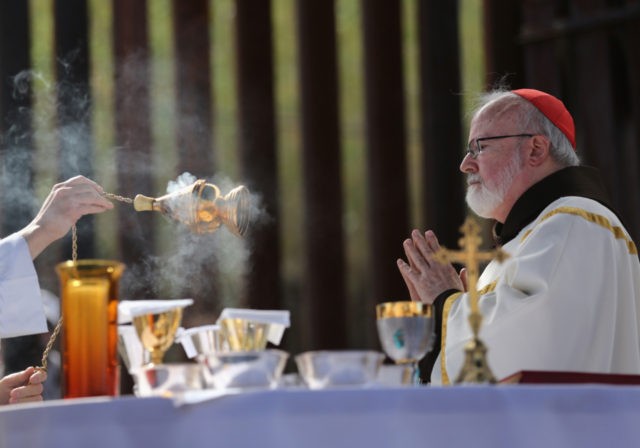Bishops from the U.S. and Mexico held a highly political Mass at the border separating their two countries on Saturday morning, insisting in a statement that “there is no ‘us’ and ‘them.’”
El Paso Bishop Mark Seitz, a vocal pro-immigration advocate, celebrated the Eucharist together with Las Cruces Bishop Peter Baldacchino and Bishop Guadalupe Torres of Ciudad Juárez, Mexico.
“In this time of high polarization around the immigration debate, discrimination, militarization of the border and a widespread spirit of exclusion in our nation,” a diocesan statement read, “the Border Mass continues to remind us, missionary disciples of Christ, that we are primarily called to live in communion.”
“For our Catholic faith, there is no ‘us and them,’ but one family of God,” the message continued. “Borders, in the spirit of the Eucharist, exist not to separate and divide, but to identify and complement one another.”
“Borders are where we encounter each other and create thriving communities in unity and diversity. Borders are places where we share each other’s journey,” it said.
“When we celebrate this Border Mass here where El Paso meets Ciudad Juarez and the U.S. meets Mexico, we are proclaiming the Good News of a Eucharistic Border,” it concluded.
Last month, Bishop Seitz wrote a searing “pastoral letter” denouncing President Trump’s border wall as a “monument to hate” and a symbol of exclusion and racism.
While insisting that xenophobia is “ravaging the United States” in a desperate effort by Caucasians to shore up white privilege and perpetuate “institutionalized racism,” the bishop said that this racism targets Latinos in a particular way, in his letter titled “Night Will Be No More.”
Although “this hatred of Latinos is not new,” the grave racism directed at Latinos today “has reached a dangerous fever pitch,” he declared.
“Ancient demons have been reawakened and old wounds opened,” he proposed, and this racism shows itself in an acute way in the border wall between the U.S. and Mexico.
“Our highest elected officials have used the word ‘invasion’ and ‘killer’ over 500 times to refer to migrants, treated migrant children as pawns on a crass political chessboard, insinuated that judges and legislators of color are un-American, and have made wall-building a core political project,” the bishop stated, and while the wall precedes Mr. Trump, he has made it a central plank of his platform.
“The wall is a powerful symbol in the story of race,” he adds. “It has helped to merge nationalistic vanities with racial projects.”
The wall “is not just a tool of national security,” Seitz alleged. “More than that, the wall is a symbol of exclusion, especially when allied to an overt politics of xenophobia. It is an open wound through the middle of our sister cities of El Paso and Ciudad Juárez.”
“The wall deepens racially charged perceptions of how we understand the border as well as Mexicans and migrants. It extends racist talk of an ‘invasion’. It perpetuates the racist myth that the area south of the border is dangerous and foreign and that we are merely passive observers in the growth of narco-violence and the trafficking of human beings and drugs,” he said.
According to the website of the El Paso diocese, this year’s joint border Mass is the twenty-second of its kind, dating back to 1998. For 18 years, the Mass was held at the U.S.-Mexico border fence in Anapra but was moved to the Rio Grande canal near the Santa Fe Bridge in 2016.

COMMENTS
Please let us know if you're having issues with commenting.